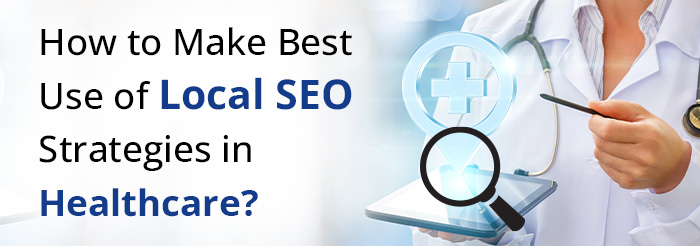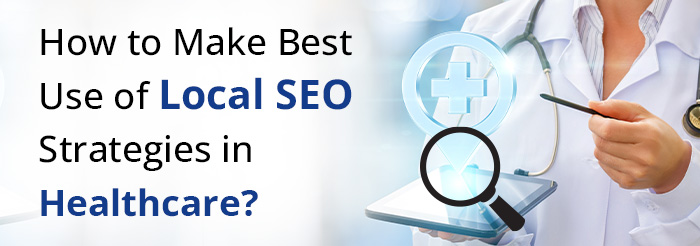
How Can You Make the Best Use of Local SEO Strategies in Healthcare?
It’s no secret that the vast majority of private healthcare practices rely on attracting patients who live or work within their local geographic areas. By the same token, most patients look for healthcare practices that are geographically nearest to them in order to reduce their travel time and provide themselves with greater convenience.
In order for healthcare practices to attract those high-value patients, they use a strategy called local search engine optimization (SEO). That’s because local SEO for medical professionals is the best way to help more local patients find their practices online. In this article, we’ll explore the best strategies for achieving healthcare local SEO for your practice.
What is healthcare local SEO?
In its most basic sense, local SEO is about increasing your website’s visibility for those prospective patients who want healthcare services in your area. Optimizing your healthcare site for local SEO will help you:
- Reach more local patients by increasing your site’s visibility to search engine web crawlers
- Boost your website’s rank in local searches
- Make a positive first impression with a well-designed website, which will make patients more inclined to engage with your practice online
- Improve your site’s user experience (UX) for patients
- Improve your patient’s perception of your practice
When you optimize your site for healthcare local SEO, your site will appear higher in local searches that include the term “near me.” This helps Google understand the users’ intent to find their desired location within their near vicinity — searches like “orthopedic surgeon near me” or “back pain specialist near me.”

How do you get started with local SEO for medical professionals?
Here are five ways that you can build and enhance your medical local SEO:
1. Improve your website
About 90% of visitors will abandon a website that is slow loading. Nearly 80% will leave for non-responsive issues, and 70% will leave due to poor navigation and other usability issues. Remember that your healthcare website is often the first point of contact for your practice for many of your patients.
Your website must be visually appealing and optimized for usability. It’s your healthcare practice’s first impression for new patients, so it should exude professionalism, expertise, and care to your patients. You should optimize your medical practice’s web pages specifically for local searches. It’s critically important for your patients to have a good experience with your practice (including your website) from beginning to end.
What are the local SEO best practices for your healthcare website?
- Your clinic’s phone number and hours of operation must be consistent and placed in a visible location somewhere on your website, typically within a footer or “Contact Us” subpage or both.
- Your website should have simple navigation so users can find information quickly.
- Your practice colors and design should be integrated into the pages.
- You should have integrated CTA (call-to-action) buttons that help move patients towards the next step.
- You should include complete contact information so prospects can get in touch.
- You should include visuals (photos, illustrations, and videos) to make your content more engaging and break up text blocks on the page.
- You should integrate a responsive design, so your practice’s site automatically adapts and displays correctly on any device. People often use mobile devices to find the right doctor.
2. Create fresh, informative content for local patients
When it comes to medical local SEO, there’s no substitute for high-quality, relevant content. You also want your patients to have access to accurate health information.

Relevant content can be a goldmine of information and keywords that search engines can use to rank your website. Strong content also helps establish your authority as a healthcare practice. If you want to attract more patients to your practice, you must invest in creating good content for prospective patients. Here are some examples of content:
- Information about a local event you’re hosting or attending (wellness fair, flu shot event, etc.)
- Feature article about a new medical professional joining your team
- Feature article about a new technology or treatment in your practice
- Article about a new service you’re offering at your practice
- Video about how to stay healthy in the winter or summer
- Services you perform for specified areas
- Information on new locations in those areas
- Health-related events you sponsor or attend (health fairs, flu shot events)
Include location-based keywords in your content. The city where your healthcare practice is located is an important keyword to include throughout your website content. And be sure to
use local keywords where appropriate in your content URLs, headings, title tags, meta descriptions and image file names.
3. Claim your Google Business Profile listing
If you really want success with local SEO for healthcare, start by claiming your Google Business Profile listing. This listing typically appears at the top of search results along with two other local businesses. This is known as the “local SEO 3-pack.” If you haven’t yet claimed your Google Business Profile listing, it’s easy and free to claim it by providing your:
Practice’s name
Address
Contact information (phone number, email)
Hours of operation
Photos of your practice
A small blurb about your practice

By adding this information, you’ll provide local searchers with a detailed listing of your practice.
4. Manage your local listings
As a local business, your information is posted on multiple websites and directories. It’s important that you manage your local listings to ensure you’re providing everyone with the exact same accurate information about your practice. Always check your listings to make sure that your practice information is 100% accurate. Always verify your:
Name
Contact information
Hours of operation
Location
Services
It’s crucial that you keep your listings consistent, so patients have accurate information about your practice, regardless of where they find you.

If you find incorrect information on any publisher, platform, or directory where your healthcare information appears, take action to correct the information immediately. In many cases, those directories require you to claim your listings to verify that the information that they have gathered about you is correct.
5. Ask for and respond to patient reviews
The importance of online reviews for healthcare practices has soared in recent years. Today, 80% of consumers trust online reviews as much as personal recommendations. Online reviews have become a necessary part of healthcare practice marketing because 84% of patients use online reviews to evaluate healthcare practitioners.
People want to find the right practice for their personal needs. When researching your practice, they’ll search reviews to aid their decision-making process. Reviews can build your practice’s trustworthiness in your community and help patients understand how you handle negative feedback. That’s why it’s essential to manage them.
To obtain more positive reviews, ask your current satisfied patients to rate their experience at your practice. Encourage them to leave feedback on your Google Business Profile or other local listings by giving them a handout with information on how to review. You can also send an email or an automated text message. When a patient leaves a review, take time to respond to them.
How to respond to patient reviews
If it’s a positive review, show your appreciation and thank them for taking the time to leave the review. If it’s a negative review, apologize for the patient’s negative experience and ask them to follow up with your practice so you can get more information and rectify the situation.
Remember, it’s good to have some negative reviews because it allows people to get a full picture of your practice. It also lets you showcase how your practice values transparency.
Gathering more positive reviews helps your practice gain trust and build credibility with new patients who are checking out your practice. Good reviews encourage more prospects to interact with your listing and visit your website to learn more about your practice.
If you need help with local SEO services, you should consult a local SEO agency or a local SEO company and take advantage of their expertise. Just remember that local SEO will help you drive more patients to your practice.
[adsanity align=’alignnone’ id=20686]
Looking For Healthcare Marketing Agency For Hospitals , Clinics, Doctors?
Call Pursho @ 0731-6725516







